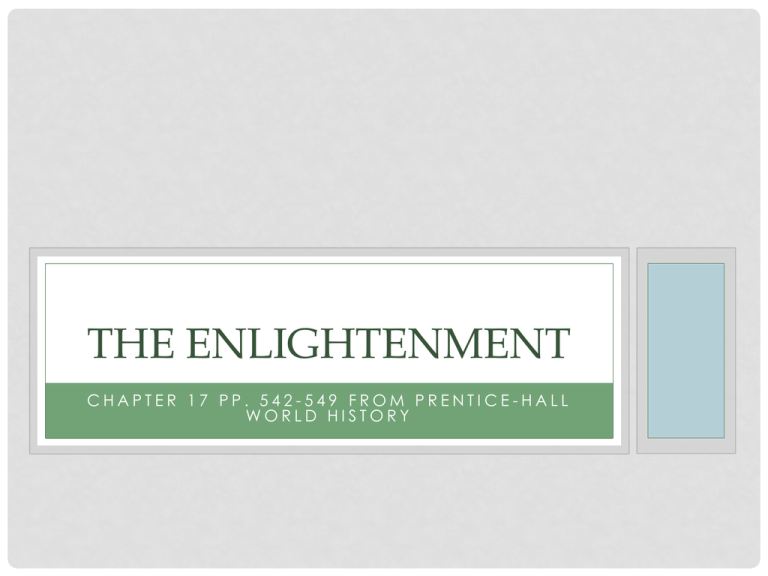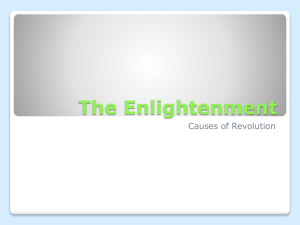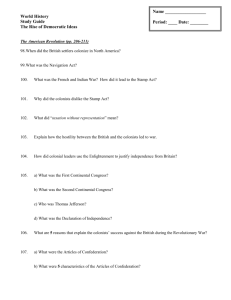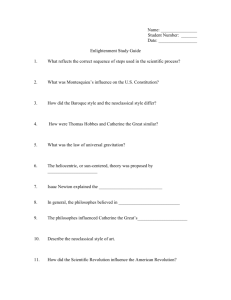
THE ENLIGHTENMENT
CHAPTER 17 PP. 542-549 FROM PRENTICE-HALL
WORLD HISTORY
ENLIGHTENMENT IDEAS SPREAD
• New ideas challenge society
• People began to question “divine right” & class system
• Church & government censored writers, banned books
• Writers sometimes wrote fiction to expose corruption without
getting in trouble (Voltaire and Montesquieu)
• Salons in women’s homes, Philosophes’ ideas spread
• Started with noblewomen hosting poetry readings in homes
• Middle class women began to do it as well
Re-creation of a French Salon from the
Museum of Decorative Arts in Lyon, France
PHILOSOPHY IN THE AGE OF REASON
• Enlightenment sparked by scientific revolution of
1500s and 1600s
• Scientific discoveries of 1500s and 1600s changed the way
people looked at the world
• Natural law- rules that can be discovered through reason
• People started to believe that reason could solve social
problems as well as scientific problems= The Enlightenment
Left: Rene Descartes, French scientist of the late
Renaissance, stressed human reasoning in
understanding the world
Right: Immanuel Kant, German philosopher of
late Renaissance/early Enlightenment era, first to
speak of an “enlightenment”
OPPOSING VIEWS OF SOCIETY
• Thomas Hobbes and John Locke: conflicting views
• Hobbes: supported strong government (absolute monarchy),
thinks people are basically terrible, developed idea of a social
contract
• Locke: people basically good, had natural rights (life, liberty,
property), supported limited government
John Locke, whose
ideas inspired
revolution around
the world!
Of Hobbes and Locke,
which do you think had
more of an impact on
the American Revolution?
THE PHILOSOPHES
•
•
•
•
•
Montesquieu and the Separation of Powers
Freedom of Thought: Voltaire
Denis Diderot’s works
The Social Contract: Jean-Jacques Rousseau
Wollstonecraft: Equal edu. for women and men
Left: Voltaire, French author of Candide
Right: Rousseau, author of The Social Contract
NEW ECONOMIC THINKING
• Mercantilism- government regulates prices and
tariffs to gain favorable balance of trade
• Laissez-faire economics= government should stay
out of the economy, free trade
• Adam Smith- argued for free market, said economy
runs on a system of supply and demand
• Smith also believed government should stay out of
economy, but did have a responsibility to protect
society
SOME THINGS TO THINK ABOUT:
• How did the Scientific Revolution that took
place during the Renaissance affect the
Enlightenment?
• How were the opinions of Hobbes and
Locke different, as they relate to
government’s role?
• What kinds of ideas or topics did the
Philosophes address in their writings?
NEW IDEAS REFLECTED IN LITERATURE
AND THE ARTS
• Movement of Baroque to Rococo
• Heavy, bright, grandiose to light, charming, and elegant
• Religious and military themed art to lighter topics
• Popular in spite of Philosophes dislike
Which of these
paintings is
baroque, and
which is rococo?
Portrait of Carl Gustaf Wrangel
by David Klöcker Ehrenstrahl
Jean-Frédéric Schall Gardener in Straw Hat
Composers inspired by Enlightenment
• Introduction of what we call classical music
• Opera and ballet become popular all over Western Europe
• Bach, Handel, Haydn, Mozart
•
•
Drawing of Mozart
By Doris Stock, 1789
painting of
J.S. Bach
• New literary form: the Novel
• Growing middle class wanted stories in prose form
• Daniel Defoe, Robinson Crusoe
ENLIGHTENED DESPOTS LIKE THE NEW IDEAS
• Reform attempts by Frederick II
• Prussian king from 1740 to 1786, absolute monarch
• Allowed free press, religious toleration, reduced
torture use
• Catherine the Great’s response
• She studied works of Philosophes & admired them
• Religious toleration, reduction of torture, criticism
of serfdom
• More reforms by Joseph II
•
•
•
•
Traveled in disguise to get a feel for regular people
Like his mom(Maria Theresa), wanted to improve peasants’ lives
Religious equality for Protestants and Jews, abolition of serfdom
Many of his reforms were canceled after his death
LIVES OF THE MAJORITY
• Slow to change
• Early 1700’s
• Most people lived in country, didn’t hear new ideas
• Late 1700’s
• Enlightenment ideas started to spread to even the lower classes
• Some people didn’t want change, just wanted stable lives
• Others started revolutions to try to bring about social change
Three Peasants
Engraving by Albrecht Dürer
QUESTIONS TO THINK ABOUT:
• What did people opposed to the Enlightenment do to
stop these new ideas from spreading?
• Why did the philosophes want to share their ideas with
the rulers of Europe?
• Why was life so slow to change for many Europeans?
BIRTH OF THE AMERICAN REPUBLIC
• Britain as a global power
Location- island, large navy= good position to control trade
Few restrictions on trade= good for business
Won wars against France
gained control of Spanish slave trade (later abolished slavery in
their territories)
• 1707= union of England, Scotland, & Wales (Ireland added later)
• King George III
•
•
•
•
• 60 year reign started 1760
• Placed his friends in important positions to strengthen his power
• Got them to Parliament to gain support for his policies
• Many of his policies did not work out well for him
MID-1700S IN AMERICAN COLONIES
• String of colonies on east coast of what would become US, not
united or connected
• Britain applied mercantilist policies to force colonists to buy from
them and sell to them
• Navigation Acts were supposed to regulate trade and production,
(were not enforced)
• Smuggling was so common that the colonists didn’t see anything
wrong with it
• Colonists were more diverse than in Great Britain, social lines were
blurred
• Colonists set up their own assemblies and practiced open and free
discussion
COLONISTS UNHAPPY WITH THE SITUATION
• Various actions by Parliament and King George III were
making colonists mad (taxes)
• Colonists rebel
• March 1770= Boston Massacre
• 1773- Boston Tea Party
• First Continental Congress met in Philadelphia to discuss options
• Colonists declare their independence
• April 1775= Revolutionary War started in Massachusetts
• 1776= 2nd Continental Congress set up the Continental Army with
George Washington in charge
• Thomas Jefferson wrote Declaration of Independence,
full of Enlightenment ideas
• Life, liberty, pursuit of happiness Popular sovereignty=
government by consent of the governed
Adopted by Continental Congress on July 4, 1776
AMERICAN REVOLUTION
• Advantages:
• Britain: better trained soldiers, huge navy, natural resources,
support of about 1/3 of colonists and some Native tribes
• Colonists: home court advantage, strong leadership, dedicated
to winning their independence
• France supports the colonies
• 1777- Colonists won the Battle of Saratoga, France decided to join
(so did other nations)
• Washington held his troops together in dire circumstances
• Treaty of Paris ends the war
• 1781- French blockade of Chesapeake Bay forced British to
surrender (Yorktown)
• 1783- Treaty of Paris ended the war, forced Britain to recognize
the United States of America
A NEW CONSTITUTION
• Articles of Confederation
• Too weak, focused on states’ rights, not central gov’t
• 1787- framers met to write new constitution (Washington,
Madison, Franklin, etc.)
• Huge impact of Enlightenment ideas
• Took Montesquieu’s idea of separation of powers & checks and
balances
• Federal Republic- states within a nation, each with rights
• Government as social contract (Locke, Rousseau)
• elected president and legislature (could be replaced)
• Bill of Rights guaranteeing certain freedoms
• Became supreme law of the land in 1789 (over 220 years old!)
SYMBOL OF FREEDOM
• Our struggle for independence inspired revolutions
in Latin America and France
• Many other nations have constitutions that are
based on ours!
QUESTIONS TO THINK ABOUT:
• What Enlightenment ideas are found in the
Declaration of Independence?
• What advantages did the British have in the
American Revolution? What advantages did the
colonists have?
• What Enlightenment ideas are found in the
Constitution?
HOMEWORK:
• Create a word document with the “Questions to
think about” questions typed in order.
• Answer the questions in complete sentences with
proper grammar and spelling.
• Submit the assignment to me via Moodle
• When we meet next we will discuss the
Enlightenment group project that you will do.
WORKS CITED:
• Ellis, E. G., & Esler, A. (2007).Prentice Hall world
history. Boston, Mass.: Pearson Prentice Hall.
• All photographs are from Wikimedia Commons and
are in public domain due to one of the following
reasons:
• Copyright expired due to age of the work
• Reproduction of a work already in public domain
• No copyright exists






